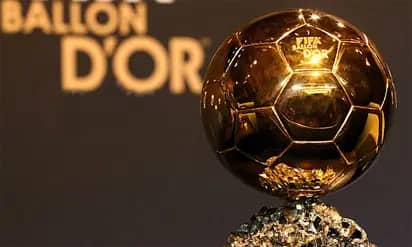Football fans around the world, mark your calendars! The prestigious Ballon d’Or, the most coveted individual award in the sport, is scheduled to dazzle audiences on September 22, 2025, in the romantic and historic city of Paris. Announced by France Football in collaboration with UEFA, this year’s ceremony promises to be a grand celebration of the finest talents in both men’s and women’s football for the 2024/2025 season. With nominations set to be unveiled on July 30, 2025, anticipation is already building for what could be one of the most competitive races in the award’s storied history. In this detailed blog post, we’ll dive into everything you need to know about the 2025 Ballon d’Or, from its significance to what fans can expect at this year’s gala.
The Ballon d’Or: A Legacy of Excellence
Since its inception in 1956 by France Football, the Ballon d’Or (French for “Golden Ball”) has been the ultimate recognition of individual brilliance in football. Originally awarded to the best male player in Europe, the award has evolved over the decades to become a global honor, celebrating players from all corners of the world. In 2018, the introduction of the Ballon d’Or Féminin expanded the accolade to recognize the best female footballer, cementing the award’s commitment to inclusivity and the growing prominence of women’s football.
The Ballon d’Or is more than just a trophy; it’s a symbol of a player’s ability to transcend the game, combining skill, leadership, and impact on the pitch. Legends like Lionel Messi, who holds a record eight Ballon d’Or titles, Cristiano Ronaldo with five, and modern stars like Aitana Bonmatí, who claimed the 2024 women’s award, have all etched their names into football history through this honor. Each year, the award sparks heated debates among fans, pundits, and players alike, as the football world dissects performances, statistics, and moments of magic to determine who deserves to be crowned the best.
Key Dates for the 2025 Ballon d’Or
The road to the 2025 Ballon d’Or is paved with anticipation, starting with the announcement of the nominees. According to France Football and UEFA, the shortlist for both the men’s and women’s awards will be revealed on July 30, 2025. This date will set the stage for weeks of speculation and analysis as fans and experts weigh in on who has the edge in the race.
The ceremony itself, scheduled for September 22, 2025, will be held in Paris, a city synonymous with elegance and football prestige. The choice of September is notable, as it aligns with the early stages of the 2025/2026 European club season, ensuring that the performances from the 2024/2025 season—spanning domestic leagues, continental competitions like the UEFA Champions League, and international tournaments—are still fresh in voters’ minds.
What to Expect at the 2025 Ceremony
The Ballon d’Or ceremony is not just an awards show; it’s a spectacle that brings together the biggest names in football. Held in a glamorous Parisian venue, the event is expected to feature a red-carpet arrival, heartfelt speeches, and tributes to the sport’s greatest ambassadors. Fans can anticipate a star-studded guest list, including past winners, club managers, and rising talents, all gathered to celebrate the game’s elite.
In addition to the men’s and women’s Ballon d’Or, the ceremony will likely include other prestigious awards, such as:
-
Yashin Trophy: Honoring the best goalkeeper of the season.
-
Kopa Trophy: Recognizing the best young player under 21.
-
Gerd Müller Trophy: Awarded to the top goal-scorer across major competitions.
These categories ensure that a wide range of contributions to the sport are celebrated, from clutch saves to clinical finishing. The 2025 ceremony may also feature special tributes, perhaps honoring retiring legends or commemorating significant milestones in football history.
The 2024/2025 Season: A Battleground for Contenders
The Ballon d’Or is judged based on performances over the football season, which for the 2025 award spans the 2024/2025 campaign. This period includes domestic leagues (e.g., Premier League, La Liga, Serie A, Bundesliga), continental competitions (e.g., UEFA Champions League, Europa League), and international tournaments, such as the 2025 FIFA Club World Cup and qualifiers for the 2026 FIFA World Cup.
For the men’s award, the race is expected to be fiercely competitive. Players like Mo Salah, who dominated the 2024/2025 Premier League scoring charts, and Raphinha, whose flair and leadership at Barcelona have captivated audiences, are likely to be frontrunners. Emerging stars like Lamine Yamal, the young Barcelona prodigy, could also make a case if they sustain their meteoric rise and also a masterclass performance from league 1 winner ( Ousmane Dembele). The performances of players in the revamped UEFA Champions Ligue, with its new league-phase format, will carry significant weight, as will contributions to national teams in international competitions.
On the women’s side, the Ballon d’Or Féminin race is equally compelling. Aitana Bonmatí, the 2024 winner, remains a strong contender thanks to her masterful playmaking for Barcelona and Spain. However, she faces stiff competition from players like Alexia Putellas, who continues to redefine midfield excellence, and Sam Kerr, whose goal-scoring prowess for Chelsea and Australia is unmatched. The growth of women’s football, with record-breaking attendance and investment, means the 2025 award will shine a spotlight on a truly global pool of talent.
The Voting Process: Who Decides the Winner?
The Ballon d’Or is decided by a panel of international journalists, with one representative from each of the top 100 FIFA-ranked nations for the men’s award and the top 50 for the women’s award. Voters rank their top five players based on three key criteria:
-
Individual Performance: Goals, assists, and overall impact on the pitch.
-
Team Success: Contributions to club and international triumphs.
-
Fair Play: Sportsmanship and conduct both on and off the field.
This transparent and merit-based system ensures that the award reflects a consensus of global football expertise. However, it also fuels debates, as subjective factors like “clutch moments” or “narrative” can influence voters’ choices. For example, a player who leads their team to a dramatic Champions League victory may edge out a statistically superior rival.
Join our Whatsapp channel to stay updated always!


